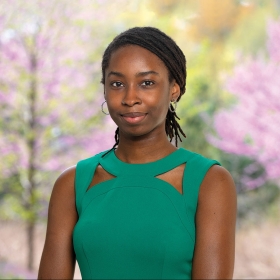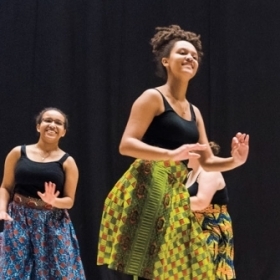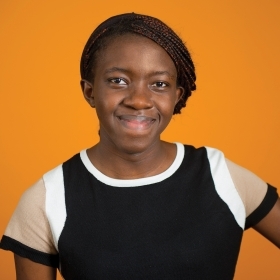Bilqis Ayeni ’23
When Bilqis Ayeni ’23 first heard about the Mastercard Foundation Scholars Program for young people in Africa, it sounded so unbelievable, she actually laughed. As a student in Nigeria hoping to attend college abroad, she learned about the scholarship in an advertisement her mother sent her.

When Bilqis Ayeni ’23 first heard about the Mastercard Foundation Scholars Program for young people in Africa, it sounded so unbelievable, she actually laughed. As a student in Nigeria hoping to attend college abroad, she learned about the scholarship in an advertisement her mother sent her. She was immediately drawn to the opportunity when she saw Wellesley was a host college—she happened to have just met an admitted student in Nigeria who raved about the College.
Once she researched the scholarship pro-gram, Ayeni says, it seemed like “they are not just paying for college, but they are paying you to go to college.” The scholarship covers tuition, but also flights, room and board, medical bills, and any other expenses that may come up— including graduation caps and gowns.
“I remember just laughing at that, like that was an exaggeration or marketing ploy to get you to apply,” she says. But she’s come to realize that the program was as good as it seemed. The scholarship funding, she says, was “definitely a determining factor” in her ability to study at Wellesley. But she was also drawn to what’s at the heart of the scholarship—a strong emphasis on community, service, and support.
As the Mastercard Foundation puts it, the scholarships are meant to create a “transformative network of young people and institutions driving inclusive and equitable socioeconomic change in Africa.”
The foundation partnered with Wellesley to fund the tuition, living, and travel expenses of students, primarily from Africa, who are committed to becoming the drivers behind that social and economic progress. All the foundation asks in return, Ayeni says, is that the scholars give back to their communities in their own ways. A total of 23 students at Wellesley from the classes of 2017 through 2023 took part in the program; this year’s seniors are the final cohort.
As a host school for nearly a decade, Wellesley created a community of faculty, staff, and students to support its scholars—a community Ayeni now just refers to as her family. It includes the director of the Slater International Center, the deans of intercultural education, and the faculty advisors who mentor students in the classroom, and also invite them to join their dinner tables.
Ayeni has thrived at Wellesley as a neuroscience major. She has always been interested in STEM fields and loves to find interdisciplinary connections to the major, from peace and justice studies to computer science. She also served as co-president of the Wellesley African Students Association and delighted in trying any “random” thing Wellesley has to offer, like rock climbing.
From the moment she met Ayeni as a first-year, Slater International Center Director Tana Ruegamer says she felt she was “very mature” and wasn’t afraid to ask questions despite being in a new environment. Ayeni became the heart of that community of scholars she cherished. She went on to work with Slater to serve as a liaison to the foundation to help that family continue to thrive; Ruegamer says she is a “natural leader.”
In April, the class of 2023 scholars and their mentors gathered at Harambee House to celebrate the graduates. The scholars spoke passionately about having found their place on campus through people who really understood them and their cultures and traditions. And they expressed gratitude for the faculty who had guided them through. There were not many dry eyes in the room, Ruegamer says.
Ayeni plans to intern at a venture capital firm—just to “try something different,” she says. She’s also received a prestigious Projects for Peace award, created by Kathryn Wasserman Davis ’28, with which she plans to dig into the root causes of lack of peace in Nigerian communities and help them articulate exactly what peace looks like to them.
Although the Mastercard Foundation Scholars Program at Wellesley has now phased out, the College still has a close connection to the foundation, Ruegamer says. The program, she says, “brought an incredible group of scholars to Wellesley—each group was so strong.” Their impact on the campus—including the scholars’ own experiences, scholarship, and passion for justice—will be felt for years to come, she says. Meanwhile, the scholars are out in the world as Wellesley alums, enacting the change they want to see.

